
So previously your trusty pupdog shared lots of material that document the role of Wall Street, and Bonesmen Prescott Bush and his father-in-law George Herbert Walker in the financing of Hitler from 1924 onward and the selling of Nazi securities AFTER Pearl Harbor (work that thoroughly pissed the right-wing off and was later confirmed -- and an inspiration for -- similar work by Charles Higham in "Trading With the Enemy" and by "The Secret War Against the Jews" by John Loftus and Mark Aarons. Please note Walker was the founder of G. H. Walker & Co., which is now part of the Merrill Lynch conglomerate.
The blood-proud members of the Russell, Pierpont, Edwards, Burr, Griswold, Day, Alsop and Hubbard families were prominent in the pro-British party within the state. Many of their sons would be among the members chosen for the Skull and Bones Society over the years. The background to Skull and Bones is a story of Opium and Empire, and a bitter struggle for political control over the United States.
Samuel Russell, second cousin to Bones founder William H., established Russell and Company in 1823. Its business was to acquire opium from Turkey and smuggle it into China, where it was strictly prohibited, under the armed protection of the British Empire.
The prior, predominant American gang in this field had been the syndicate created by Thomas Handasyd Perkins of Newburyport, Massachusetts, an aggregation of the self-styled ``blue bloods'' or Brahmins of Boston's north shore. Forced out of the lucrative African slave trade by U.S. law and Caribbean slave revolts, leaders of the Cabot, Lowell, Higginson, Forbes, Cushing and Sturgis families had married Perkins siblings and children. The Perkins opium syndicate made the fortune and established the power of these families. By the 1830s, the Russells had bought out the Perkins syndicate and made Connecticut the primary center of the U.S. opium racket. Massachusetts families (Coolidge, Sturgis, Forbes and Delano) joined Connecticut (Alsop) and New York (Low) smuggler-millionaires under the Russell auspices.
Why the Master Race Concept Sat So Well With Prescott -
"War Against the Weak: Eugenics and America's Campaign to Create a Master Race." by Edwin Black, Four Walls Eight Windows Press, N.Y. 2004 which documents thoroughly, the role of key Bonesmen and S and B in the "eugenics movement" in the U.S. and Britain that directly inspired and directed the sterilization laws against minorities in 27 U.S. states and that directly inspired the "race laws" of the Nazis from 1933 onward. The role of S and B in the "First International Eugenics Conference" London, 1912, the Second in New York City in 1921 and the Third also at the infamous American Museum of Natural History (the center of the eugenics movement) in 1932 that produced directly the leading concepts and "theoreticians" that produced the first Nazi "race laws" in 1933 is well documented.

The Nemesis destroys a Chinese ship during the Opium War.
Ever wonder why Bush Junta II's Puppet Boy King is paying the equivalent of his Presidential salary in taxes this year. It to cover up the '

Gilman
Opium Wars
Before the early 18th century, the British East India Company paid for its tea mainly in silver. However, when the price of silver rose, the East India Company began to manufacture a product that was desired by the Chinese as much as tea was by the British: opium. This had a significant influence on both India and China. Opium was also imported into Britain and was not prohibited because it was thought to be medically beneficial. Laudanum, which was made from opium was also used as a pain killer, to induce sleep and to suppress anxiety. The famous literary opium addicts Thomas De Quincey, Samuel Taylor Coleridge and Wilkie Collins also took it for its pleasurable effects. The Limehouse area in London was notorious for its opium dens, many of which catered for Chinese sailors as well as English addicts.
In 1773, the Governor-General of Bengal was granted a monopoly on the sale of opium, and abolished the old opium syndicate at Patna. For the next 50 years, opium would be a key to the British East India Company in its hold on India. Since importation of opium into China was illegal (the Chinese could manufacture enough opium for medicinal purposes themselves) the British would sell tea in Canton on credit, carrying no opium, but would instead sell off the right to smuggle the opium at auction in Calcutta. In 1797, the company would end local Bengal purchasing agents, and would require direct sale of opium to the company by farmers.
In 1799 the Chinese Empire reaffirmed its ban on opium imports, and in 1810 the following decree was issued:
"... Opium has a very violent effect. When an addict smokes it, it rapidly makes him extremely excited and capable of doing anything he pleases. But before long, it kills him. Opium is a poison, undermining our good customs and morality. Its use is prohibited by law. Now the commoner, Yang, dares to bring it into the Forbidden City [i.e., ]. Indeed, he flouts the law! He should be turned over to the Board of Punishment, and should be tried and severely sentenced."
Bear in mind the addictive properties of the drug, the misery of the population in China, and the vast need for silver of the British Government combined to press opium trade higher. In the 1820's opium trade averaged 900 tons per year from Bengal to China.
The First Opium War was a trade-inspired war between the United Kingdom and the Qing Empire in China from 1839 to 1842. It is often seen as the beginning of European imperial hegemony towards China. The conflict began a long history of Chinese resentment toward Western society that still has remnants today.
In the early 19th century, trading in goods from China was extremely lucrative for Europeans. But trade to China suffered from the fact that China professed no interest in foreign products, such that it was difficult to find trading goods the Chinese might buy. Silver was one, to the extent that the drain on European specie metals was noticeably affecting the economy. In casting about for other possible commodities, the British soon discovered opium, and would use its narcotic effects for capitalistic gain. Between 1821 and 1837 imports of the drug increased five-fold. The drug was taken from India and shipped by British traders to China.
The Chinese government attempted to end this trade, on public health grounds -- numerous opium addicts were appearing in trading ports throughout China. The effort was initially successful, with the official in charge of the effort Lin Zexu, eventually forcing the British Chief Superintendent of Trade in China, Charles Elliott to hand over all remaining stocks of opium for destruction in May 1839.
However, the next month two British sailors murdered a Chinese man, and were arraigned under a British legalism called "extraterritoriality." The sailors were brought to justice in a British court in Canton (Guangzhou). The Chinese, however, demanded that the British hand the two men over to Chinese custody.
Refusing, the British were expelled from China. Preparing for war, they seized Hong Kong (then a minor outpost) as a base. Fighting began in July, when Volage and Hyacinth defeated 29 Chinese ships. The next year, the British captured the Bogue forts which guarded the mouth of the Pearl River --the waterway between Hong Kong and Guangzhou. By January 1841, their forces commanded the high ground around Guangzhou, then defeated the Chinese at the nearby city of Ningpo (modern-day Ningbo) and the military post of Chinhai.
By the middle of 1842, the British had defeated the Chinese at the mouth of their other great trading river, the Yangtze, and had occupied Shanghai. The war finally ended in August 1842, with the Treaty of Nanking. Gen. Sir Anthony Blaxland Stransham led the Royal Marines during the Opium War as a young officer, and as the 'Grand Old Man of the Army', was awarded two knighthoods by Queen Victoria.
The Treaty of Nanking committed the Chinese to free trade, including that of opium. Hong Kong island was ceded to the UK, and the Treaty Ports of Guangzhou, Amoy (Xiamen), Foochow (Fuzhou), Shanghai, and Ningpo were opened to all traders. Reparations were also paid by the Chinese.
The ease with which the British forces had defeated the Chinese armies seriously affected the Qing dynasty's prestige. This almost certainly contributed to the Taiping Rebellion (1850–1862). For the victors, the Opium War paved the way for the opening up of the lucrative Chinese market and Chinese society for missionary purposes.
In 1859, after China refused to allow the setting up of Foreign legations in Beijing, a naval force under the command of Admiral Sir James Hope attacked the forts guarding the mouth of the Peiho river. It was severely mauled and forced to withdraw under the cover of fire from an American naval squadron commanded by Commodore Josiah Tattnall.
In 1860, an Anglo-French force gathered at Hong Kong and then carried out a landing at Pei Tang on August 1, and a successful assault on the Taku Forts on August 21. On September 26, the force arrived at Beijing and had captured the city by October 6. Appointing his brother, Prince Gong Yixin, to be in charge of negotiations, Emperor Xianfeng fled to the Summer Palace in Chengde. British-French troops in Beijing set the Summer Palace and the Old Summer Palace on fire. The Old Summer Palace was totally destroyed. Beijing was not occupied however the troops remained outside the city itself.
The motives for the destruction of the Summer Palace are an interesting subject for debate. The official reason stated by Elgin was to discourage the Chinese from using kidnappings as a bargaining tool, and to exact revenge on the Emperor for his violation of the flag of truce. Other options were discussed but Elgin deemed this the "least objectionable". It is very likely however that it was largely to do with the treatment of the prisoners taken rather than the actual taking of prisoners. Another possible explanation is that Elgin was insulted by the decadence of the palace, and was especially offended by the European palaces in the Old Summer Palace. Chinese historians have claimed that is was to cover up the widespread looting which occurred, and there is some evidence for this, not least in the fact that many people, such as Loch, and the French general Montauban, denied that widespread looting took place. For more information George McDonald Fraser's "Flashman and the Dragon" provides a good overview on the subject.
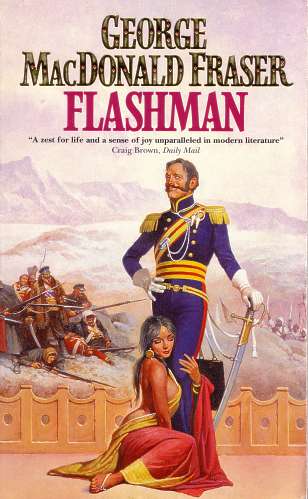
The First Flashman Book
Opium Clippers Enable the
United States of America
to Steal the Monopoly from
Great Britain.

The Flying Cloud of 1851 was the most famous of the extreme clippers built by Donald McKay in East Boston, Massachusetts. The Flying Cloud was purchased at launching by Grinell, Minturn & Co, New York, for $90,000. Within six weeks she sailed from New York and made San Francisco round Cape Horn in 89 days, 21 hours under the command of Captain Josiah Perkins Cressey. On July 31, during the trip, she made 374 miles in 24 hours. In 1853 she beat her own record by 13 hours, a record that stands today for a sailing vessel.
On June 19, 1874 the Flying Cloud went ashore on the Beacon Island bar, St John's, Newfoundland and was condemned and sold. The following June she was burned for the scrap metal value of her copper and metal fastenings.
=Links=
* http://www.wsu.edu:8080/~dee/CHING/OPIUM.HTM
* http://en.wikipedia.org/wiki/William_Jardine
* http://takaoclub.com/opium/index.htm
Covers to look for:
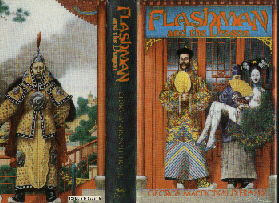
The Original Hardcover Dust Jacket
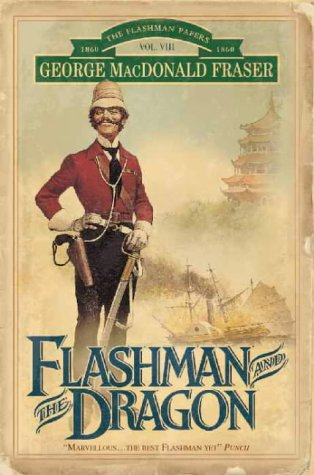
A Paperback
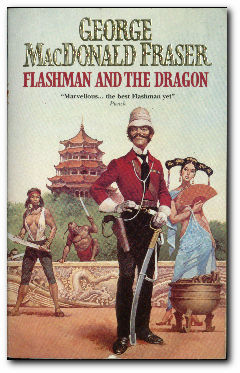
Another Paperback
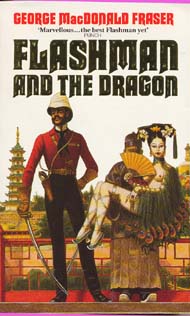
A Paperback inspired by the original dustjacket ...
- Zen Pup Dog
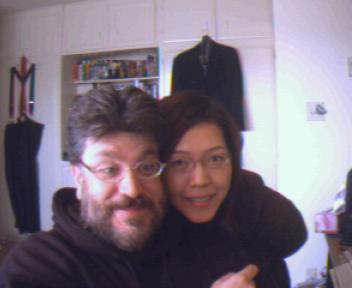
No comments:
Post a Comment